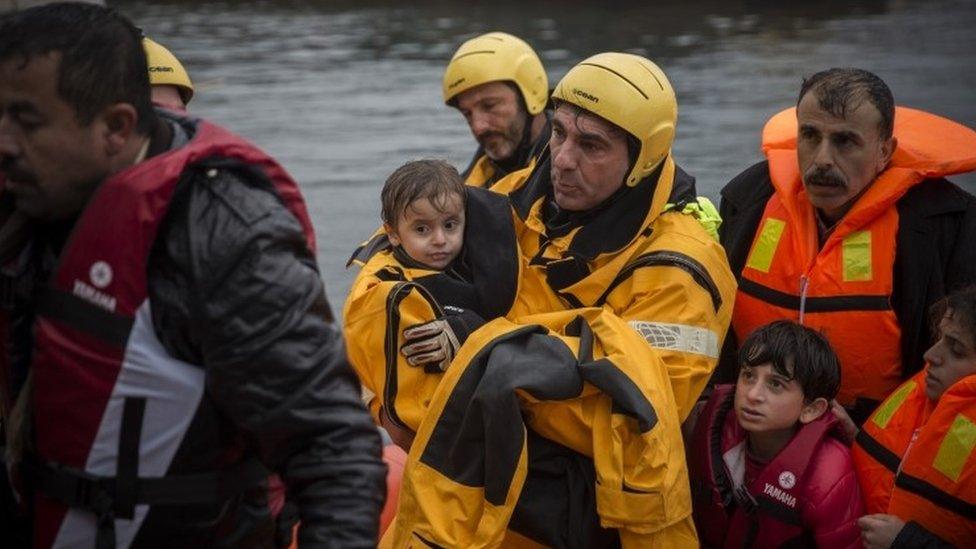Migrant crisis: EU to prioritise new border force
- Published

Record numbers of migrants have arrived in Europe this year
The EU will move rapidly towards setting up a new joint border and coastguard force over the next six months, EU leaders have said.
"We should adopt a position by July [on the force]", European Council President Donald Tusk said.
It would have a stronger mandate than the current Frontex border agency, which suffers from a lack of resources.
Record numbers of migrants have reached Italy and Greece by boat this year.
Greece is the biggest headache for the EU, as many migrants travel north from there without being registered.
Hungary was the first to build a fence to stem the flow, but more fences have gone up. The return of many border controls has undermined the Schengen freedom of movement principle.
Worries about the 26-nation Schengen zone - where passport checks are largely absent - dominated the Brussels summit.
EU members are "failing to protect our external borders", Mr Tusk said.
But Mr Tusk stressed after talks that "we can be a bit more optimistic because all the leaders agreed to protect Schengen".
He also said that extra Frontex staff would be deployed in Greece this month.
Chris Morris: Two key things on the agenda at the summit
Concern about the infiltration of jihadists soared after last month's atrocities in Paris, adding to concerns about people traffickers and other criminals crossing EU borders easily.
But Hungary and Poland insist that the new EU border force must not undermine national sovereignty.
The European Commission plan says the EU must have authority to deploy the force even to a country that did not request it, if necessary. But it would still operate alongside national border staff.
Also on Thursday, EU leaders discussed a bid by British Prime Minister David Cameron to reform his country's relationship with the EU.
European Council president Donald Tusk said the talks represented a "make or break moment".

Slow progress on plans to solve crisis
Relocation of 160,000 refugees from Italy and Greece Progress: Only 184 relocated to other EU countries
Resettling 22,000 refugees "in clear need of international protection" from camps in Middle East Progress: about 600 refugees resettled to EU
Eleven "hotspot" migrant reception centres in Italy and Greece Progress: Two operating so far
Common EU list of "safe" countries where migrants can be sent back to Progress: Not yet agreed
Reduce number of migrants arriving in EU by boat Progress: About 4,000 migrants still arriving daily in Greece by sea from Turkey - not much fewer than November average
EU experts and equipment deployed in Greece and Bulgaria to help border staff Progress: Frontex agency still short of resources
Source: Luxembourg EU presidency

The fight against terrorism is expected to feature heavily on Friday after it emerged at least two of the Paris attackers used the migrant route to travel to France.
But writing in his summit invitation, external, European Council President Donald Tusk was keen to keep migration and terror as separate issues.
"The protection of our external borders is not intended to scare off those who flee wars or persecution," he said.
Many of the migrants are refugees from the conflicts in Syria, Iraq and Afghanistan.

As a tumultuous year draws to a close, European leaders are struggling to maintain unity, the BBC's Chris Morris in Brussels says.
The UN's refugee agency says, external 954,481 migrants and refugees have landed on Europe's shores this year, and more than 800,000 of them have arrived in Greece.
Most travel north via the Western Balkans to countries such as Germany and Sweden.